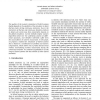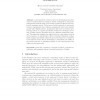275 search results - page 4 / 55 » On Hybrid Combination of Queueing and Simulation |
113
click to vote
IEEECIT
2010
IEEE
15 years 10 days ago
2010
IEEE
The quality of the numeric simulation of hybrid systems highly depends on the capability of the simulator to detect discrete events during continuous evolutions. Due to the intera...
111
click to vote
JAIR
2008
15 years 1 months ago
2008
In a facility with front room and back room operations, it is useful to switch workers between the rooms in order to cope with changing customer demand. Assuming stochastic custom...
115
click to vote
WSC
2007
15 years 4 months ago
2007
Agent-based models (ABMs) are powerful in describing structured epidemiological processes involving human behavior and local interaction. The joint behavior of the agents can be v...
SIAMSC
2008
15 years 1 months ago
2008
Abstract. Hybrid or multiphysics algorithms provide an efficient computational tool for combining micro- and macroscale descriptions of physical phenomena. Their use becomes impera...
121
click to vote
MACE
2009
Springer
15 years 8 months ago
2009
Springer
Learned models of behavior have the disadvantage that they must be retrained after any change in system configuration. Autonomic management methods based upon learned models lose ...


